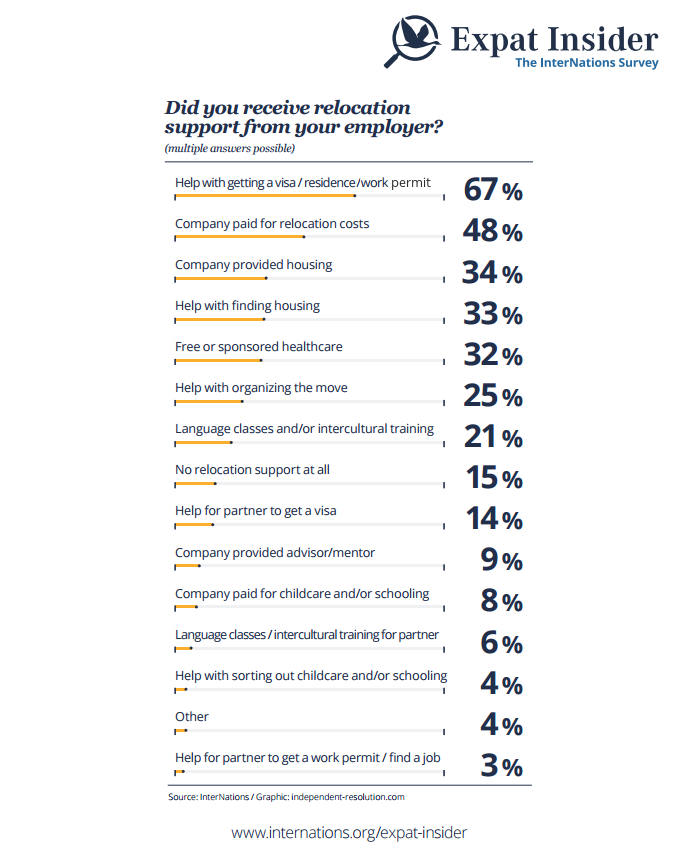Expats and the Support They Receive
Foreign Assignees and Foreign Recruitees receive the most relocation help from their employer. Traveling Spouses only get a little support and Career Expats are largely on their own.
At a time when international careers are ever more common, relocating abroad - whether alone or with a family - comes at a cost. This is why many companies offer relocation support to their foreign employees.
Survey respondents who named job-related reasons as their primary motivation, as well as those who chose their partner's job as their main reason for moving abroad, were asked to rate their satisfaction with the support they received.
Unfortunately, the results are only somewhat better than mediocre. In fact, 28% of respondents are unhappy with their relocation support. On the other hand, 47% are generally satisfied.
Relocation Support

Common Types of Relocation Support
Foreign Assignees received the most help with securing their visa (80%), followed by Foreign Recruitees (71%). In comparison, only 54% of Career Expats and 40% of Traveling Spouses* had help with arranging their visa.
Generally speaking, spouses and Career Expats received far less support throughout the relocation process than respondents sent abroad by their employer or recruited by a foreign company. For instance, 12% of Foreign Recruitees and 4% of Foreign Assignees had no help at all, compared to 18% of Traveling Spouses and 26% of Career Expats.
However, a lot of employers take the costs involved with relocating to a foreign country seriously and compensate expats accordingly. Reimbursing relocation costs is among the most common types of support, which Foreign Assignees (68%) and Traveling Spouses (52%) in particular benefit from.
Moreover, Foreign Assignees had a lot of support with the housing search (45%) and were provided with company housing in 42% of cases. In comparison, only 24% of Career Expats were offered accommodation and 23% had help with the housing search.
Spousal Support: What Makes or Breaks an Assignment
Spousal support is becoming essential as the dissatisfaction of expat spouses is one of the main reasons why assignments fail. Of all respondents who moved for job-related reasons, 14% had support in arranging a visa for their partner, while their spouses received language classes or intercultural training in 6% of cases. Help with securing a work permit and finding a job was provided for 3%.
However, it's worth mentioning that only 44% of Foreign Assignees, 42% of Foreign Recruitees, and 32% of Career Expats are in a relationship with someone they met before relocating.
The partners of Foreign Assignees are well off: 22% of assignees had help in obtaining a visa for their partner, while 12%, twice the total average, say that their partner got language classes or intercultural training, and 5% received support in arranging a work permit or finding a job for their partner.
On the other hand, things look rather grim for Career Expats. Only 8% had help with securing their partner's visa, while language classes or intercultural training, as well as support with the partner's job search and work permit, was only granted for 2%.
Among the Traveling Spouses themselves, 40% had help with visas or residence permits, and 14% got to attend language classes or intercultural seminars. Unfortunately, only 7% had help with getting a work permit and even less (4%) with the job search.
Help with Childcare and Education
Kids also play a big role in an expat's life. Overall, 4% of those moving for career-related reasons had help with sorting out childcare or schooling while the employer paid for the kids' education in 8% of cases.
Foreign Assignees, 19% of whom have dependent children living with them, received help with organizing childcare or schooling in 7% of cases and 12% had their company pay for their kids' education. On the other hand, 18% of Foreign Recruitees have dependent children, but only 4% had help with arranging the school or daycare. Their employer paid for schooling in only 6% of cases.
The situation looks even worse for Career Expats. While 17% of them are parents of dependent children living with them, their employer paid for their kids' education in only 3% of cases and only 2% had help with organizing childcare or schooling.
This is the only factor where Traveling Spouses received more help than other expat types. For 13% of them, the partner's company paid for their children's education and 7% had help with organizing childcare or schooling abroad. In total, 35% of Traveling Spouses have dependent children living with them.
Further Reading
- Expat Insider 2015 - Where Expats Love to Work Abroad
- Expatriate Benefits: Perks of an Expat Job
- How to Benefit From Your Expat Status
- Repatriate Issues and Company Support
- Company Benefits for Repatriates
- The Trailing Spouse: Gender Roles Abroad
- BBC Capital: The Reluctant Expat Spouse
* The Expat Insider survey does not distinguish between spouses of Foreign Assignees, Foreign Recruitees, or Career Expats, though.



